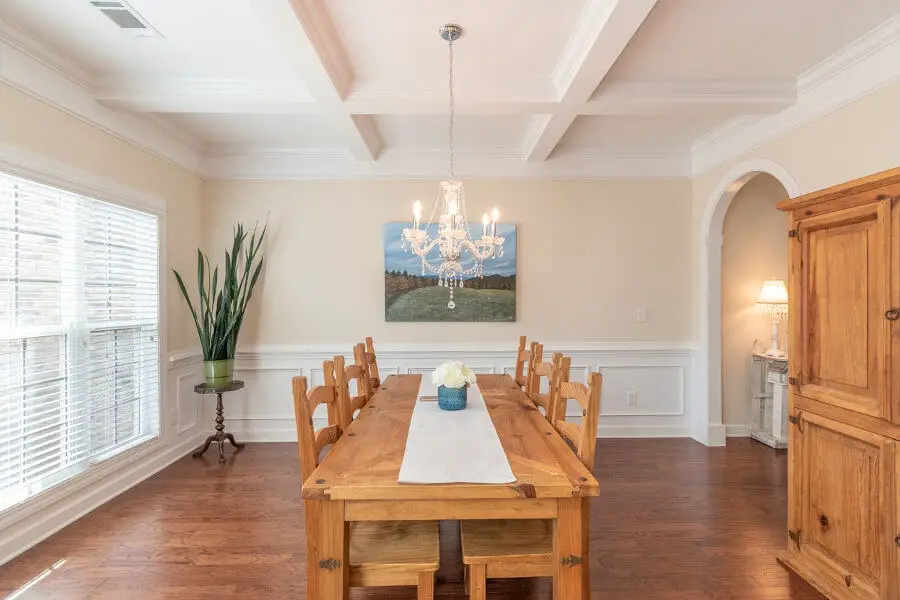
Most families only get one opportunity to bond regularly, and it’s usually when they’re seated around the dining table sharing a meal. This is where most of us bring our guests too.
It’s safe to say that the dining room is an important space for fostering familial and social relationships. Improving this area’s Feng Shui allows you to deepen the connections forged here and to ward off negative energies.
As expected, the dining room Feng Shui mostly revolves around the central feature: the table. However, good Feng Shui also involves the seating arrangement, what you put on the table, and other features that can add to or detract from the positivity of that area.
In this enlightening guide, we share advice and tips for dining room Feng Shui for those interested in optimizing Qi’s flow in one of the most important living spaces.
The shape of the dining table
Ideally, the best Feng Shui dining table should be round to promote equality to everyone seated. A round dining table eliminates the “head” position that all rectangular tables have, providing an equal platform for conversation and eye contact.
In addition to that, using a round table removes the negative effect of sharp angles. Feng shui associates angles and sharp points with negative energy. These piercing structures may instill nervousness and anxiety in the room.
If you lack the space for a round dining table, the next best alternative is an oval dining table. Coming in third is the square dining table. Despite its angles, the even sides allow everyone equal opportunity to engage in conversation with each other.
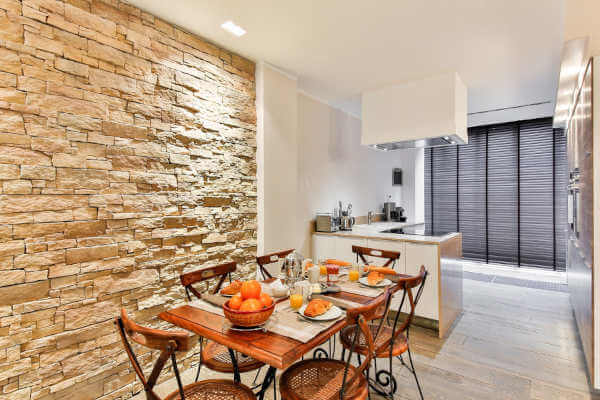
The right dining table material for Feng Shui
Wood is the best material for a dining room table. It has pleasant aesthetics a psychologically calming effect, and in feng shui, it is a grounding element that represents stability.
It makes sense to have a high-quality wood dining table, especially since it is the most likely to be in keeping with the room’s décor.
Even if you prefer chic and modern designs, try to avoid dining tables with glass tabletops. Like sharp corners, glass is a conduit for negative energy.
Why size matters in dining room feng shui
Nothing sends uninviting vibes more than a dining table without enough space. The size of your table should be enough for your family and expected guests. You can probably create more space by adjusting the size of the chairs and experimenting with the seating arrangement.
Related Reading: Common Things you Should NOT Keep at Home According to Feng Shui – Opens in new tab
How to position the dining table for good Feng Shui
It is bad feng shui to position the dining table between two access points. It shouldn’t block the line between windows and doorways. These spaces must remain open to attract health and good luck.
If you can’t reposition the dining table, consider rerouting the flow of positive energy using bells and wind chimes. Hanging these above the windows can redirect positive energy back into the interior of your home.
Keep the dining table away from the walls. Ideally, it should be centered to invite balance and equality. Propping one side against the wall is uninviting as it wastes space that could otherwise accommodate more people.
Remember to endorse feelings of security by making sure no one sits with their back to a door or window. If you can’t change the seating arrangement due to lack of space, use mirrors to restore the commanding position by reflecting entryways. It will keep everyone aware and relaxed enough to enjoy the moment.
Want to learn more about Feng Shui? Check out our suggestions: Feng Shui Bookshelf – Opens in new tab
How to position dining chairs for good Feng Shui
In feng shui, symmetry and balance will bring you more luck than randomness. That’s why it’s a good idea to have an even number of chairs around your dining table. Creating even structures will keep energies balanced, whereas odd or unbalanced numbers may cause imbalances in the flow of Qi.
When placing chairs, avoid directing any of them towards the bathroom door. In feng shui, having the bathroom door in sight while dining can affect the health and wellbeing of a family. It can also ruin your appetite.
Ideally, your dining table should be nowhere near the bathroom, especially if you want to promote and maximize your family’s health and wellbeing.
How to Incorporate Feng Shui Dining Room Colors to Balance the Elements
The dining room is perhaps the best place to experiment with feng shui colors. The right colors will stimulate appetite and set the mood for a warm encounter with friends and family.
You can use several colors that resemble food in your dining room. That’s one of the perks of dining room feng shui.
Since it may not be possible to physically represent them, colors help you to restore the balance of the five elements: fire, metal, water, earth, and wood. Here is how to use colors for dining room feng shui.
Use Red, Orange, Yellow, and Purple for Fire
Colors that represent the fire element can stimulate a lively dining experience. Use them if you want the dining room to be a place for joyous conversation and socialization. However, be careful not to overstimulate the dining area as it may lead to nervousness and unrest.
Colors that represent the fire element include warm colors like red, orange, and yellow. Fruits like apples, strawberries, mangos, oranges, and bananas can be used to enhance the fire element in the room to liven up social gatherings.
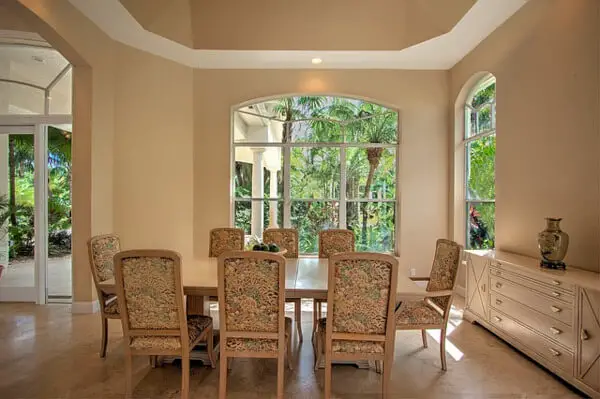
Use Grey, White, and Silver for Metal
Adding metal energy isn’t a necessity, but it is warranted because it brings harmony with the other elements. Therefore, you should take any opportunity you get to bring in metallic accents, sculptures, and utensils to invite the prosperity represented by the metal element.
If not, go for colors such as white, grey, and silver to add more metal energy to the dining room. You can add metal tones via the color of your furniture, artwork, or even dining utensils.
Use Blue and Black for Water
Even though the water element is necessary for Qi to flow, using colors that represent it too much could kill appetites and bring a depressive mood.
In the right amounts, however, water energy is calming. It encourages a relaxed and open environment. Apart from installing water features, you can invite water energy using glass and shades of blue and black.
Fruits like blueberries and blackcurrants adequately represent the water element and are appetizing and nourishing.
Related reading: 11 Feng Shui Benefits That Will Transform Your Life (From Sleep to Success!)-Opens in new tab
Use Beige, Sand, Yellow Pastels, and Light Brown for Earth
Earth tones attract abundance and prosperity, but they’re better known as warm and soothing. There is no better way to make your dining room feel cozy and inviting than to use colors like beige, light brown, sandy brown, and yellow pastel to mimic earth energy.
You’ll find these colors in foodstuffs like eggshells and bananas, but you can also opt for ceramics (pots and plates) or a crystal display as the table’s centerpiece.
Use Brown, Green, and Teal for Wood
Wood energy represents growth and nourishment. Apart from blue, green is the most appetizing color, which is why it’s a natural fit for the dining room.
Inviting wood energy into the dining room using greens, teal, and browns can stimulate healthy food consumption. These colors bring balance to the environment, and they can affect both external (social interactions) and internal (digestion) attributes of our lives.
Aside from wooden furniture, you can use greenhouse plants to attract wood energy into your dining room.
Other Tips for Dining Room Feng Shui
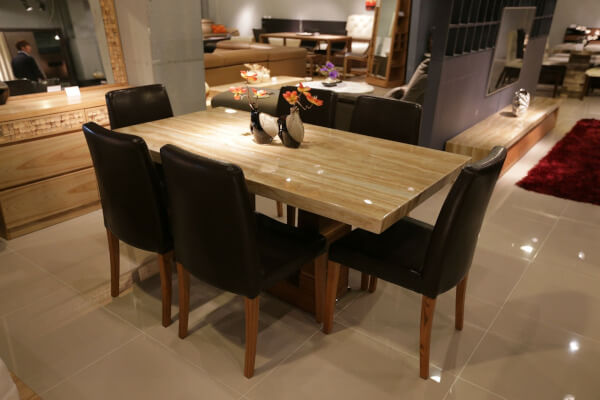
The dining table should never be empty
The dining table should always serve a purpose. Even when it’s not time to eat, it should have something on top of it. Ideally, it should be something edible like a bowl of fruit.
However, you can also use fresh flowers and other decorative features.
Whatever is on your dining table should symbolize freshness, nourishment, and wholesomeness. Avoid leaving any deteriorating flowers or fruit on it.
Hang a mirror to reflect the dining table
Hanging a mirror to reflect your dining table is a good way to expand your familial and social connections. Mirrors are used in feng shui to replicate or mimic energies. For example, positioning a mirror to reflect the kitchen stove can double prosperity.
Mirrors reflect Qi around the room. You can even use them to direct energies from outside (such as a nice view) into your space. A mirror is what you would need to expand the appearance of a room or bring more natural light.
🍀 Our “Feng Shui Master” app is your trusted companion, offering a useful guide to implementing Feng Shui principles. Try it now!
Use Feng Shui-appropriate colors whenever possible.
Using the right colors can enhance appetite and improve the feng shui of the dining area. It’s important to pay attention to the location of the dining table and room in relation to the cardinal directions.
If the dining table is on the Northern side of the room, then feng shui dictates emphasis on the color blue. If it’s in the Eastern side, then the color to focus on is green. You can achieve the right balance of colors through decorating the table or chairs in blue décor. Think about accessories like flowers, vases, napkins, and candles in the desired color.
Coasters should match the table’s shape.
Using coasters that correspond to the shape of the dining table adds an element of continuity to your dining experience. Even this seemingly little adjustment matters a great deal in feng shui.
That means getting round coasters for round tables, square coasters for square ones, and even oval coasters if need be.
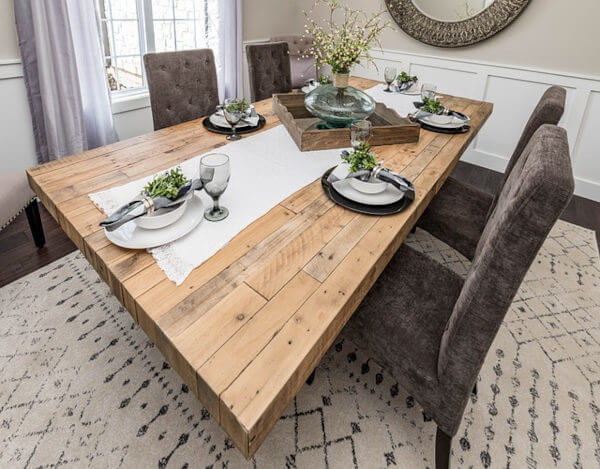
Keep electronic devices out of the dining room.
Electronics possess a great deal of yang energy and could overload your dining room. What’s more, they are sources of distraction in a room where distractions disrupt the process of social bonding.
There’s a reason why smartphones ruin mealtimes and social interactions, and it’s backed by science. Leaving the electronics out of the dining room allows for more social bonding. Mealtimes provide an opportunity to talk and connect, and while plopping a TV in the dining room may feel comfortable and even natural, it ultimately stops you from experiencing unbridled social connections.
Clocks are also banned from the dining room, according to feng shui. They symbolize the passing of time in a room that’s meant to be “yung yuan te,” which loosely translates to “eternal.”
Feel free to include water features
The dining room is an important area of the home, and therefore it needs as much luck as it can get. One way to attract lucky energy to a room is by adding house plants and water features.
The presence of clean flowing water and plant features can be a benefit. It makes everyone feel comfortable, which improves the likelihood of honest communication and social connection.
Water features symbolize energy, luck, health, and richness of life. They can also stand for continuity, especially in the case of flowing fountains. It can represent never-ending health and nourishment since the dining room is where we go to feed and replenish energy.
Incorporate wall art, but wisely
To stimulate calming or “yin chi” effects, the dining room décor should be based on neutral colors such as pastel. While it’s okay to incorporate wall art to liven the room further, avoid having anything too busy or too loud as it can draw attention away from the calming environment.
The same applies to highly patterned wallpaper. Busy patterns like this can split the Qi in a room and cause uneven distribution of energies.
Want to learn more about Feng Shui? Check out our suggestions: Feng Shui Bookshelf – Opens in new tab
Declutter the dining area
Good feng shui demands cleanliness and organization. It is just as important to ensure that the dining room only serves one purpose. Avoid treating it like a multi-purpose room as that leads to the accumulation of non-relevant items.
Get rid of any toys and gadgets lying around, and don’t allow magazines and books to pile up around the dining area.
Dedicate this part of your home to nourishing your physical and social needs. It should be a place that invites an appetite for food, drink, and socialization.
Keep the dining room clean.
This is one of the areas of your home that should stay clean and fresh at all times. Maintaining high levels of hygiene in the dining area is a way of being mindful of the energy flowing around the room. Dirty energy invites illness and poor health, whereas a fresh and clean environment promotes good health and nourishment.
Mind the lighting
Lighting in the dining area should be plentiful, especially during the day. Natural light can make the room look bigger and fresher. Furthermore, good lighting makes the food appear more appetizing.
Here are some of the most popular feng shui rules, organized by room, from our other articles.
- Feng Shui Rules and Tips for Your Front Door and its Surroundings
- Best Feng Shui Rules and Tips for the Living Room
- Basic Feng Shui Rules and Tips for Dining Room
- Basic Feng Shui Rules and Tips for Kitchen
- Basic Feng Shui Rules and Tips for the Bedroom
- How to Feng Shui Your Bathroom
- Basic Feng Shui Rules and Tips for Staircases and How to Apply them
- Simple Guide to Feng Shui Your Workspace
- Feng Shui Your Garden: Design Your Dream Garden with Feng Shui Principles
Take a look at some Feng Shui product ideas – Opens in new tab
Stay in Touch
 Join our newsletter by using the forms on this website or click here!
Join our newsletter by using the forms on this website or click here! Follow us on Google News
Follow us on Google News Follow us on Facebook
Follow us on Facebook
Featured image by Ernest Roy from pixabay




